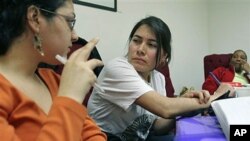For many Americans, Labor Day [September 5] has come to mean a three-day weekend and an end-of-summer barbecue. The original spirit of the holiday, though, which honors the dignity of labor and the struggle for social justice, is alive and well among New York state's 200,000 immigrant domestic workers, who have just won a legislative victory granting them the basic workers' rights many others take for granted.
Related video report by Mil Arcega
The combination of determination and joy on the faces of Christine Lewis and Jennifer Bernard is typical of the membership of Domestic Workers United, known simply as DWU.
They are spending their day off from their nanny and elder-care duties to prepare for Labor Day, when they plan to march with about 200 other DWU members, to reach out to other women like them.
Lewis, who is from Trinidad, said domestic workers are undervalued.
“I am a domestic worker. I am an activist. I am an advocate. I am on the front line for change in this industry,” she said.
During the 1930s, when Congress granted most workers the power to form unions and to bargain collectively, legislators in southern U.S. states insisted farm workers and domestic workers, most of whom were African-American at that time, be excluded. Lewis said this is a legacy of slavery that continues today.
“Listen, the work that we do in the home is real work. We make all other work possible," she said. "We are working on someone’s kitchen, cleaning some little baby’s behind, I'm working. We are the help. And we are still working for peanuts [low wages and few benefits].”
Because they work in isolation in homes, not in factories or hospitals, domestic workers often must stand up alone to their employers when demanding fair treatment, such as overtime pay, days off, paid vacations and sick leave.
Nanny Jennifer Bernard recalls working for one mother who was consistently rude, almost to the point of abuse. After a particularly ugly incident, Bernard walked out of her job and refused to return without an apology, which she finally received. But Bernard said she wanted more than a personal victory to come from that experience.
“I felt the urge then to really talk to my sisters [fellow domestic workers] in the neighborhood and to tell them I have gained ground in that way," said Bernard. "A lot of them were like ‘I can not do that. I cannot afford to be not working.’ I said, 'Well I never thought about losing my job. I thought about gaining respect!' And I just started telling my girls, ‘I want you to stand up for yourself!'”
Bernard learned that Domestic Workers United organizes Caribbean and Latino women in rallies like this one, calling for a state law mandating wages and benefits, regardless of immigration status.
DWU Director Priscilla Gonzalez said fear of deportation is a common reason domestic workers hesitate to organize.
“Of course, as domestic workers know all too well, a lot of employers will use someone’s status against them to exploit, to deny wages, to keep them imprisoned. There are a lot of workers who have been brought here by diplomats, who have been trafficked and are forced into illegal status because of their employers,” said Gonzalez.
Last year, New York state became one of the first states to adopt legislation protecting domestic workers. Gonzalez said this was a huge victory for the movement, and explained the next step is to educate workers and employers about the law.
“And it's also about continuing to build and organize many more workers, get employers to comply, and also to go beyond the minimum standards set by the law so that workers actually have the safety and security they need to be able to live and work with dignity and respect on the job,” said Gonzalez.
Domestic workers like Bernard and Lewis say they plan to continue that effort at the Labor Day parade.
New York State Domestic Workers Organize for Rights




